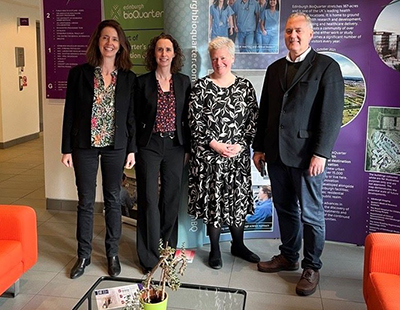Scotland’s AI and life sciences showcased in Edinburgh BioQuarter visit

L-R: Perdita Fraser, Senior Advisor to the Vice-Chancellor; Dr Andrea Taylor; Roz Campion; Professor Stuart Forbes
The UK Government’s Director of the Office for Life Sciences (OLS) visited Edinburgh BioQuarter this week to understand how the health innovation district is contributing to health care advances globally.
Rosalind Campion’s office sits in both the Department of Health and Social Care and the Department for Science, Innovation, and Technology and aims to solve some of the world’s biggest healthcare challenges, such as dementia, cancer and obesity.
The 187-acre BioQuarter is in a major phase of development to create one of Europe’s largest health innovation districts, having received £600 million of investment to date with a further £800 million to come. It boasts one of the largest concentrations of stem cell and regenerative medicine researchers in the world, two major hospitals – the Royal Infirmary of Edinburgh and the Royal Hospital for Children and Young People (Sick Kids), NHS offices, lab space and growing life science companies, many of them University of Edinburgh startups or spinouts.
Over two days, Ms Campion met University leaders and clinician researchers for roundtable discussions about how Edinburgh’s expertise in artificial intelligence interacts with population scale data and deep biological disease models to support the work of the OLS missions.
Her delegation also toured facilities such as the new Institute of Regeneration and Repair and the Scotland Cancer Centre, running out of time before they could visit the Edinburgh Genome Foundry – the largest automated foundry in the world.
Dr Andrea Taylor, Strategic Partnership Director at Edinburgh Innovations, the University’s commercialisation service, who organised the visit, said: ” We were delighted to showcase how world-class research across data, digital and health and facilities in Edinburgh, in partnership with the NHS and industry, can address some of the major health challenges we face today.
Collaboration is crucial, and the NEURii partnership is a great example, where expertise in neurodegenerative biology and AI from the University has come together with global pharmaceutical company Eisai, investor Gates Ventures, Health Data Research UK and medical not-for-profit LifeArc to harness data and digital solutions to predict, prevent and protect against dementia.”
Professor Christina Boswell, the University’s Vice-Principal for Research and Enterprise, welcomed the delegation, saying afterwards: ” Our cutting-edge research in life sciences contributes to improving health and well-being, designing future health and care systems, and addressing economic and environmental challenges.
We were pleased to host this visit from the OLS, to discuss how our unique strengths in data and AI for biomedicine can be applied across their missions, especially through the exciting expansion of our Edinburgh BioQuarter innovation hub.”
Professor Tim Walsh is Professor of Critical Care at the University and Director of Innovation for NHS Lothian. He described the relationship between Scottish universities and the Scottish NHS as crucial for innovation. He said: ” Our well-governed relationship means that the University of Edinburgh and NHS Lothian can co-design research projects, for example, which gives us access to tissue samples, crucial data from across health boards, and patients for clinical trials.
The unique structure of the NHS means we potentially have the richest health data in the world, which can unlock innovation if we manage it right.”
Rosalind Campion said: ” Our mission at the Office for Life Sciences is to ensure life sciences thrive in the UK, including through tackling some of our most pressing health challenges across key mission areas such as obesity, cancer and dementia.
I am grateful to everyone who helped pull together such a brilliant and extensive programme for the visit. It really showcased Edinburgh and Scotland as a region with huge potential for attracting investment and generating economic growth, particularly in the area of AI and life sciences: regenerative medicine, advanced therapeutics and engineering biology.”



